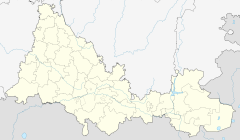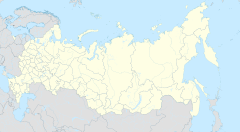Federal Governmental Institution — Penal Colony No. 6 of the Federal Penitentiary Service of Russia in Orenburg Oblast,[a] commonly known as the Black Dolphin Prison (Russian: Чёрный дельфин, romanized: Chyorny delʹfin) and formerly known as NKVD Prison No. 2 is a correctional facility in Sol-Iletsk, Orenburg Oblast, Russia, near its border with Kazakhstan.[1] The prison is one of the oldest in Russia, and one of the first in the Orenburg Oblast to accept prisoners with life sentences. It gets its unofficial name from a prisoner-constructed[2] sculpture depicting a black dolphin, which is set in front of the main entrance.
 | |
| Coordinates | 51°9′20″N 54°59′35″E / 51.15556°N 54.99306°E |
|---|---|
| Status | Operational |
| Population | 700 |
| Managed by | Federal Penitentiary Service |
| Governor | Colonel Yuri Korobov |
| City | Sol-Iletsk |
| State/province | Orenburg Oblast |
| Country | Russia |
Originally, Black Dolphin was a jail (ostrog) for those sentenced to life at hard labor, since at least 1745. After the suppression of Pugachev's Rebellion in 1773, the prison was updated for the deportation and confinement of robbers. The prison houses approximately 700 of Russia's worst criminals, including child molesters, murderers, terrorists, cannibals, and serial killers.[3] Prisoners at Black Dolphin are all serving sentences of life imprisonment. The prison began accepting these inmates on 1 November 2000.[1]
Conditions
editInmates are kept isolated in cells that have a set of three steel doors. For 90 minutes a day, they exercise in a large cage; during this time, cells are searched for contraband or illegal items. Inmates are also under 24-hour surveillance and supervision; they are forced to stand and forbidden from resting or sitting on their bunks from the time they awake until bedtime (roughly 16 hours). When prison officers make a command to the inmates, they must respond with the words "yes, sir." Every 15 minutes, a guard makes rounds to ensure Black Dolphin inmates are complying with the rules. The prisoners are fed soup four times a day,[3][better source needed] and are only allowed books, newspapers, and a radio.
Prison guards place blindfolds on arriving inmates so that they cannot map out the prison or plan escapes. The inmates are also blindfolded whenever they are transported between buildings. Black Dolphin prison officers have a unique form of escorting inmates: Prisoners are kept bent over at the waist while a guard holds their handcuffed hands behind their back, higher than the hips. This escort control tactic allows for maximum control while depriving the inmate of a view of his immediate surroundings (preventing them from escaping and/or attacking prison staff).[4]
Notable inmates
editCurrent
edit- Said Amirov (born 1954), politician sentenced to life for terrorism and issuing contract killings[5]
- Stanislav Beloruscev (born 1967), serial killer
- Vladimir Borisovich Belov (born 1972), serial killer and brigand[6]
- Vladimir Draganer (born 1981), serial killer[7]
- Vadim Ershov (born 1973), serial killer, rapist, and robber
- Farit Gabidullin (born 1972), serial killer and rapist with his brother[8]
- Ramses Gaichayev (born 1976), serial killer, mass murderer, rapist, robber and brigand
- Ilnaz Galyaviev (born 2001), mass murderer
- Vadim Krotov (born 1967), serial killer and child molester
- Andrei Melyukh (born 1977), serial killer and robber
- Vladimir Mukhankin (born 1960), serial killer and rapist
- Yevgeny Nagorny (born 1972), serial killer
- Vladimir Nikolayevich Nikolayev (born 1959), murderer and cannibal[9]
- Kegashbek Orunbayev (born 1962), serial killer, rapist, necrophile and cannibal[10]
- Alexander Pirovskih (born 1958), serial killer and fraudster
- Oleg Rylkov (born 1966), serial killer, rapist, and pedophile
- Sergey Shipilov (born 1959), serial killer and rapist
- Yuri Tsiuman (born 1969), serial killer and rapist
Former
edit- Sergey Maduev (1956–2000), serial killer and brigand; died from heart failure and diabetes complications.
- Alexander Maslich (1972–2015), serial killer who committed four murders while incarcerated at different prisons; died at Black Dolphin from undisclosed causes[11]
- Carola Neher (1900–1942), actress; sentenced to 10 years for Trotskyism; was incarcerated at three different prisons, including Black Dolphin, where she died from typhus[12][13][14][15]
- Tariel Oniani (born 1952), mafia boss and thief in law, was incarcerated at Black Dolphin from 2010 to 2019 after being convicted of kidnapping and then released.
- Valery Skoptsov (1951–2004), serial killer, rapist, and thief; died from heart failure
- Mikhail Popkov (born 1964), serial killer, was incarcerated at Black Dolphin from 11 December 2018 until 2020 and then transferred.
See also
editNotes
editReferences
edit- ^ a b "Структурные подразделения." (Archive) Federal Penitentiary Service for the Orenburg Oblast. Retrieved on April 28, 2012. "В исправительной колонии содержатся осужденные к пожизненному лишению свободы."
- ^ ПУТЕШЕСТВИЕ В ОБРАЗЦОВУЮ ТЮРЬМУ. ЧЕРНЫЙ ДЕЛЬФИН. ПРИГОВОРЁННЫЕ ПОЖИЗНЕННО | Криминальная Россия, retrieved 2021-10-18
- ^ a b "All Videos: Black Dolphin Prison Archived 2012-08-22 at the Wayback Machine." National Geographic. Retrieved on April 28, 2012.
- ^ "Inside Russia’s brutal Black Dolphin prison where the only way to escape is dying" The Mirror, 7 May 2022.
- ^ "Оренбургская ПОЛИТИКА - Осуждённый за убийство и теракт экс-мэр Махачкалы будет отбывать наказание в Соль-Илецке". Retrieved 2018-03-23.
- ^ Stanislav Yuriev (February 22, 2023). "Осужденный пожизненно «ховринский маньяк» получил новый срок" [Life-sentenced convict "Khovrisky Maniac" received a new term]. Moskovskij Komsomolets (in Russian). Archived from the original on April 16, 2023.
- ^ "Решение № 2А-4721/2016 2А-4721/2016~М-3784/2016 М-3784/2016 от 5 мая 2016 г. по делу № 2А-4721/2016".
- ^ "Пожизненно осужденный маньяк признался в убийстве 18-летней давности" [Life-sentenced maniac confesses to 18-year-old murder]. REN TV (in Russian). May 18, 2021. Archived from the original on October 29, 2022.
- ^ "Каждый день ближе к свобод" [Every day closer to freedom]. ripo.com.ua (in Russian). Retrieved 28 August 2017.[permanent dead link]
- ^ Alexey Fishev (December 4, 2013). "Buryatia Supreme Court sentenced serial killer to life imprisonment" (in Russian). Arigus.tv.
- ^ "Cannibalism Latest Gruesome Symptom of Russia's Social Ills". Los Angeles Times. May 25, 1997. Archived from the original on February 26, 2024. Retrieved 2024-02-26.
- ^ Hans Schoots, Living Dangerously – A Biography of Joris Ivens
- ^ Reinhard Müller, "Menschenfalle Moskau. Exil und stalinistische Verfolgung" Hamburg 2001
- ^ Carola Neher biography, IMDb. Retrieved 28 May 2017.
- ^ Walter Held "Stalins deutsche Opfer und die Volksfront", in der Untergrund-Zeitschrift Unser Wort, Nr. 4/5, Oktober 1938, S. 7 f.; Michael Rohrwasser, Der Stalinismus und die Renegaten, Die Literatur der Exkommunisten, Stuttgart 1991, p. 163
External links
edit- "Black Dolphin Prison". fsin.su (in Russian). Federal Penitentiary Service. Archived from the original on 2012-05-11.
- "Black Dolphin Prison (Inside: Russia's Toughest Prisons)". natgeotv.com/asia. National Geographic. Archived from the original on October 26, 2011.

